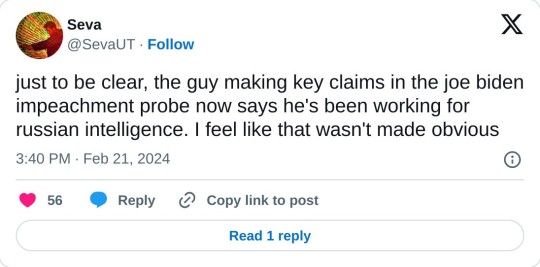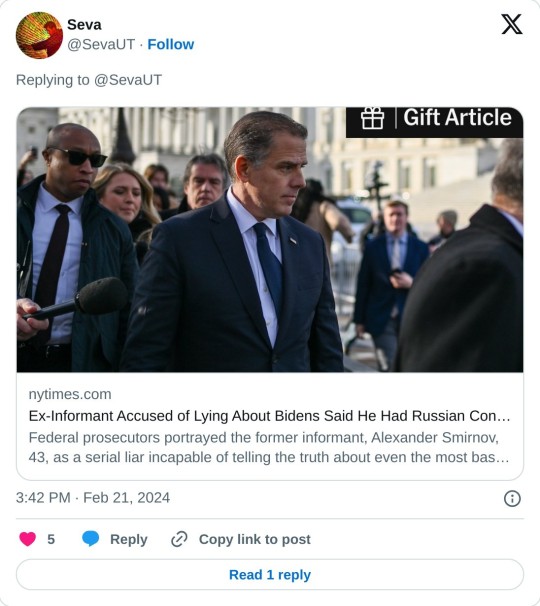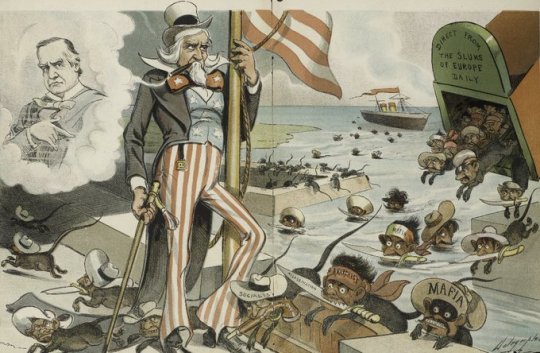#U.S. payroll report
Text
By Frederick H. Decker
Common Dreams
Nov. 29, 2023
National news media often broadcast misinformation when discussing the debt of the United States government, erroneously targeting Social Security as the main culprit whether intentionally or from genuine ignorance.
The coverage of the federal debt by news media generally considered credible often mirrors, unfortunately, the falsehoods heard from Republican lawmakers in blaming Social Security as a major driver of the federal debt. Such misleading news coverage was embedded in a recent segment aired during the week of Thanksgiving on the PBS NewsHour, which is an hour I watch regularly to typically be informed by sound journalism. But in the segment at issue here, I witnessed misinformation broadcast to the public that could shape public opinion into thinking, quite erroneously, that Social Security needs gutting because it is the culprit increasing the federal debt. It isn’t.
This particular segment on the federal debt on PBS NewsHour was introduced on Tuesday November 21 by coanchor Amna Nawaz stating how the “U.S. government remains open this Thanksgiving week, thanks to a temporary funding deal Congress passed last week.” But when that temporary funding starts expiring in January, Nawaz added, “conservatives are signaling they won’t pass another funding deal without addressing a bigger issue, the swelling U.S. national debt.”
Then coanchor Geoff Bennett and correspondent Lisa Desjardins, standing before a screen with varying charts, discussed the growing interest paid on the federal debt. As Desjardins put it, “just the interest on our debt is so large [in the past year] that it is almost [the size of} the entire Department of Defense budget.” That statement may be true, but that was not the punchline of the segment.
Social Security hasn’t reduced available general revenue nor been the reason why politicians are not funding programs for younger constituencies.
The NewsHour segment ended mirroring the Republican Party’s mantra that Social Security is the major driver of the federal debt. As Desjardins concluded “the three largest drivers of the debt are in reality” Social Security, Medicare, and interest on the debt, with each in the chart displayed indicated as accounting respectively for 21.2%, 12.9%, and 10.5% of total federal expenditures. Desjardins added, “Really what’s happening here is Congress is not addressing the big drivers of the debt at all.”
In a recent piece with misinformation embedded in its title alone, “Why We’re Borrowing to Fund the Elderly While Neglecting Everyone Else,” columnist Catherine Rampell also implied that borrowing to fund Social Security benefits will, as she wrote, “continue to crowd out future spending obligations in years ahead” on programs for the young like “pre-K, or child care, or paid parental leave, or a more generous child tax credit.”
One problem in such depictions exemplified by the NewsHour and in Rampell’s article is that Social Security, specifically, is funded almost exclusively by its own revenue source. Not by borrowing, as Ms. Rampell implies without providing supportive evidence for that contention (because there isn’t any). Nor funded by general revenue as likely many believe when seeing typical charts on federal spending (like that shown in the segment aired on PBS NewsHour) that include Social Security expenditures, which are not at all funded by general revenue but, rather, by its separate targeted payroll and income taxes.

Actually, as I have written about previously, Social Security is today the entity owning the most debt, $2.7 trillion in Treasury securities (Monthly Treasury Report, Table 6, Schedule D as of October 31, 2023). More than the two foreign governments owning the most U.S. debt, Japan today owning U.S. securities valuing $1.1 trillion and China with under $1 trillion.
Surpluses in Social Security revenue by law have to be invested in U.S. securities. And revenue surpluses have over the years been the norm in the program. Thus, Social Security for years, in essence, funded the debt with its surplus revenue, not caused it.
Social Security hasn’t reduced available general revenue nor been the reason why politicians are not funding programs for younger constituencies as Ms. Rampell alludes to in her piece. Tax cuts during the Trump and Bush administrations, however, did help do that. Growth in deficits and debt, as analysis by the Center for American Progress indicates, has largely been driven by those tax cuts. Tax cuts reducing general revenue applicable to programs like the earlier expanded child tax credit that, before expiring, lifted more children out of poverty.
The Social Security program has nevertheless, according to reports by the Board of Trustees overseeing the program, recently incurred shortfalls in its dedicated revenue stream. In 2022, a 4% shortfall noted in the trustees’ current report (Table II.B1, page 7). And those recent shortfalls have been met simply by just cashing in some U.S. securities the program acquired over the years with revenue surpluses.
But true enough, within current parameters of the program, the trustees predict the program’s reserves (i.e., securities) will be depleted by 2033. Then relying solely on Social Security’s separate tax revenue, it is predicted only 77% of benefits due will be payable. That’s not being totally broke, but it would have an adverse effect on the income many elderly depend upon.
Raising the Social Security retirement age to purportedly reduce costs also has adverse effects that, as I discussed earlier, the Congressional Research Service among others have outlined. For one, among those of lesser means who also on average have lower life expectancies, increasing the retirement age would reduce their lifetime Social Security benefits collected disproportionately relative to reductions among higher income earners with typically longer life expectancies. Increasing the retirement age would, furthermore, disproportionately harm those retiring early due to work-related health impairment suffered most prevalently in blue-collar occupations.
A different option some propose to increase revenue is eliminating the cap on the income subject to the Social Security payroll tax. In 2024 the limit on income taxed will be $168,600. Income above that limit would not currently be taxed.
However Social Security is made solvent for the future, one thing is quite clear. Social Security has not been the reason for incurred and increasing U.S. debt.
209 notes
·
View notes
Text

LETTERS FROM AN AMERICAN
July 6, 2023
HEATHER COX RICHARDSON
JUL 7, 2023
The payroll processing firm ADP said today that private sector jobs jumped by 497,000 in June, far higher than the Dow Jones consensus estimate predicted. The big gains were in leisure and hospitality, which added 232,000 new hires; construction with 97,000; and trade, transportation and utilities with 90,000. Annual pay rose at a rate of 6.4%. Most of the jobs came from companies with fewer than 50 employees.
The Dow Jones Industrial Average, which is a way to measure the stock market by aggregating certain stocks, dropped 372 points as the strong labor market made traders afraid that the Fed would raise interest rates again to cool the economy. Higher interest rates make borrowing more expensive, slowing investment.
Today, as the Washington Post’s climate reporter Scott Dance warned that the sudden surge of broken heat records around the globe is raising alarm among scientists, Bloomberg’s Cailley LaPara reported that the incentives in the Inflation Reduction Act for emerging technologies to address climate change have long-term as well as short-term benefits.
Dance noted that temperatures in the North Atlantic are already close to their typical annual peak although we are early in the season, sea ice levels around Antarctica are terribly low, and Monday was the Earth’s hottest day in at least 125,000 years and Tuesday was hotter. LaPara noted that while much attention has been paid to the short-term solar, EV, and wind industries in the U.S., emerging technologies for industries that can’t be electrified—technologies like sustainable aviation fuel, clean hydrogen, and direct air capture, which pulls carbon dioxide out of the air—offer huge potential to reduce emissions by 2030.
This news was the backdrop today as President Biden was in South Carolina to talk about Bidenomics. After touting the huge investments of both public and private capital that are bringing new businesses and repaired infrastructure to that state, Biden noted that analysts have said that the new laws Democrats have passed will do more for Republican-dominated states than for Democratic ones. “Well, that’s okay with me,” Biden said, “because we’re all Americans. Because my view is: Wherever the need is most, that’s the place we should be helping. And that’s what we’re doing. Because the way I look at it, the progress we’re making is good for all Americans, all of America.”
On Air Force One on the way to the event, deputy press secretary Andrew Bates began his remarks to the press: “President Biden promised that he would be a president for all Americans, regardless of where they live and regardless of whether they voted for him or not. He also promised to rebuild the middle class. The fact that Bidenomics has now galvanized over $500 billion in job-creating private sector investment is the newest testament to how seriously he takes fulfilling those promises.”
Bates listed all the economic accomplishments of the administration and then added: “the most powerful endorsement of Bidenomics is this: Every signature economic law this President has signed, congressional Republicans who voted “no” and attacked it on Fox News then went home to their district and hailed its benefits.” He noted that “Senator Lindsey Graham called the Inflation Reduction Act ‘a nightmare for South Carolina,’” then, “[j]ust two months later, he called BMW’s electric vehicles announcement ‘one of the most consequential announcements in the history of the state of South Carolina.’” “Representative Joe Wilson blasted the Bipartisan Infrastructure Law but later announced, ‘I welcome Scout Motors’ plans to invest $2 billion and create up to 4,000 jobs in South Carolina.’ Nancy Mace called Bidenomics legislation a…‘disaster,’ then welcomed a RAISE grant to Charleston.”
“[W]hat could speak to the effectiveness of Bidenomics more than these conversions?” Bates asked.
While Biden is trying to sell Americans on an economic vision for the future, the Republican leadership is doubling down on dislike of President Biden and the Democrats. Early on the morning of July 2, Trump, who remains the presumptive 2024 Republican presidential nominee, shared a meme of President Biden that included a flag reading: “F*CK BIDEN AND F*CK YOU FOR VOTING FOR HIM!” The next morning, in all caps, he railed against what he called “massive prosecutorial conduct” and “the weaponization of law enforcement,” asking: “Do the people of this once great nation even have a choice but to protest the potential doom of the United States of America??? 2024!!!”
Prosecutors have told U.S. district judge Aileen Cannon that they want to begin Trump’s trial on 37 federal charges for keeping and hiding classified national security documents, and as his legal trouble heats up, Trump appears to be calling for violence against Democrats. On June 29 he posted what he claimed was the address of former president Barack Obama, inspiring a man who had been at the January 6 attack on the U.S. Capitol to repost the address and to warn, “We got these losers surrounded! See you in hell,…Obama’s [sic].” Taylor Tarranto then headed there with firearms and ammunition, as well as a machete, in his van. Secret Service agents arrested him.
Indeed, those crossing the law for the former president are not faring well. More than 1,000 people have been arrested for their participation in the events of January 6, and those higher up the ladder are starting to feel the heat as well. Trump lawyer Lin Wood, who pushed Trump’s 2020 election lies, was permitted to “retire” his law license on Tuesday rather than be disbarred. Trump lawyer John Eastman is facing disbarment in California for trying to overturn the 2020 election with his “fake elector” scheme, a ploy whose legitimacy the Supreme Court rejected last week. And today, Trump aide Walt Nauta pleaded not guilty to federal charges of withholding documents and conspiring to obstruct justice for allegedly helping Trump hide the classified documents he had at Mar-a-Lago.
Trump Republicans—MAGA Republicans—are cementing their identity by fanning fears based on cultural issues, but it is becoming clear those are no longer as powerful as they used to be as the reality of Republican extremism becomes clear.
Yesterday the man who raped and impregnated a then-9-year-old Ohio girl was sentenced to at least 25 years in prison. Last year, after the Supreme Court overturned the 1973 Roe v. Wade decision recognizing the constitutional right to abortion, President Biden used her case to argue for the need for abortion access. Republican lawmakers, who had criminalized all abortions after 6 weeks, before most people know they’re pregnant, publicly doubted that the case was real (Ohio Attorney General Dave Yost told the Fox News Channel there was “not a damn scintilla of evidence” to support the story). Unable to receive an abortion in Ohio, the girl, who had since turned 10, had to travel to Indiana, where Dr. Caitlin Bernard performed the procedure.
Republican Indiana attorney general Todd Rokita complained—inaccurately—that Bernard had not reported child abuse and that she had violated privacy laws by talking to a reporter, although she did not identify the patient and her employer said she acted properly. Bernard was nonetheless reprimanded for her handling of privacy issues and fined by the Indiana licensing board. Her employer disagreed.
As Republican-dominated states have dramatically restricted abortion, they have fueled such a backlash that party members are either trying to avoid talking about it or are now replacing the phrase “national ban” with “national consensus” or “national standard,” although as feminist writer Jessica Valenti, who studies this language, notes, they still mean strict antiabortion measures. In the House, some newly-elected and swing-district Republicans have blocked abortion measures from coming to a vote out of concern they will lose their seats in 2024.
But it is not at all clear the issue will go away. Yesterday, those committed to protecting abortion rights in Ohio turned in 70% more signatures than they needed to get a measure amending the constitution to protect that access on the ballot this November. In August, though, antiabortion forces will use a special election to try to change the threshold for constitutional amendments, requiring 60% of voters rather than a majority.
LETTERS FROM AN AMERICAN
HEATHER COX RICHARDSON
#Bidenomics#Joe Biden#economy#jobs#middle class#justice#Letters From an American#Heather Cox Richardson#infrastructure#climate change
245 notes
·
View notes
Text


A former F.B.I. informant accused of making false bribery claims about President Biden and his son Hunter — which were widely publicized by Republicans — claimed to have been fed information by Russian intelligence, according to a court filing on Tuesday.
In the memo, prosecutors portrayed the former informant, Alexander Smirnov, 43, as a serial liar incapable of telling the truth about even the most basic details of his own life. But Mr. Smirnov told federal investigators that “officials associated with Russian intelligence were involved in passing a story” about Hunter Biden.
Those disclosures, including Mr. Smirnov’s unverifiable claim that he met with Russian intelligence officials as recently as three months ago, made him a flight risk and endangered national security, Justice Department officials said. Mr. Smirnov had been held in custody in Las Vegas, where he has lived since 2022, since his arrest last week.
He was released from custody on Tuesday on a personal recognizance bond after a detention hearing, said his lawyers, David Chesnoff and Richard Schonfeld.
Prosecutors did not specify which story Russian intelligence is said to have been fed to Mr. Smirnov, an Israeli citizen. But they suggested they could not believe anything he said. And they had many tales to choose from.
The memo describes Mr. Smirnov as a human hall of mirrors: He fed the F.B.I. bogus information about the Bidens and misled prosecutors about his wealth, estimated at $6 million, while telling them he worked in the security business, even though the government could find no proof that was true.
“The misinformation he is spreading is not confined” to his false claims about the Bidens, wrote prosecutors working for David C. Weiss, the special counsel investigating Hunter Biden on tax and gun charges.
“He is actively peddling new lies that could impact U.S. elections after meeting with Russian intelligence officials in November,” they added.
That appeared to refer to Mr. Smirnov’s claim, made in late 2023 to the F.B.I., that he had spoken to the head of a Russian intelligence unit who said he had intercepted phone calls made by guests at a hotel overseas. Those included “several calls placed by prominent U.S. persons the Russian government may use as ‘kompromat’ in the 2024 election,” according to prosecutors.
Mr. Smirnov also told his F.B.I. handler that he was involved in meetings to help resolve the war in Ukraine, and that he had knowledge of assassination squads operating in “a third-party country.”
Last week, Mr. Weiss charged Mr. Smirnov with fabricating claims that President Biden and his son each sought $5 million bribes from a Ukrainian energy giant, Burisma, demanding the money to protect the company from an investigation by the country’s prosecutor general.
Those allegations, which prosecutors now say were brazen fabrications motivated by Mr. Smirnov’s animosity toward the president, were widely promoted by congressional Republicans who cited it as a justification for their now-stalled effort to impeach Mr. Biden.
Mr. Smirnov was taken into custody last week as he walked off an international flight from what prosecutors described as “a monthslong, multicountry foreign trip.” During that trip, he claimed to have had contacts with multiple foreign intelligence agencies and had planned to embark on a similar trip days later, according to the memo.
What makes the Smirnov case so unusual, aside from its political significance, is the willingness of the F.B.I. to publicly burn a confidential informant who had been on the bureau’s payroll as recently as last year. The filing contained excerpts from his source reporting documents, raw notes from interviews between handlers and informants that are considered some of the most sensitive federal law enforcement documents.
Also on Tuesday, Hunter Biden’s legal team filed motions in federal court arguing that the arrest of Mr. Smirnov — while unrelated to the charges Mr. Biden faces — has tainted the public’s perception of their client, making fair trials impossible.
“It now seems clear that the Smirnov allegations infected this case,” said Abbe Lowell, Mr. Biden’s lawyer, who accused Mr. Weiss of following “Mr. Smirnov down his rabbit hole of lies.”
90 notes
·
View notes
Link
260 notes
·
View notes
Text
by Luke Rosiak
Secretary of Homeland Security Alejandro Mayorkas admitted to Congress on Wednesday that an employee who was exposed by The Daily Wire as a Hamas supporter remains on the Department of Homeland Security payroll, even as she gloats about her employment online.
Nejwa Ali was placed on leave following The Daily Wire’s report on October 18 about her posts celebrating the Hamas attacks on Israel that killed more than 1,000. At the close of a Wednesday congressional hearing about DHS finances, Rep. Dave Joyce (R-OH), who chairs the subcommittee responsible for the agency’s funding, asked Mayorkas whether Ali was still on the payroll.
“Since we’re talking about finances here… after the horrific terrorist attack on Israel on October 7, the deadliest day for the Jewish people since the Holocaust, one of your employees was exposed celebrating the attack online. It was later revealed that she previously worked for the [Palestinian] Liberation Organization, or what’s commonly known as the PLO, which is a very troublesome reputation, you’d agree. According to a public comment she made on LinkedIn as of two months ago, she was still getting paid by the department… What is the status of the investigation into her behavior?”
Mayorkas said that the “individual is on administrative leave, not performing the duties and responsibilities for which she was hired,” but that “the investigation is ongoing” and that he “cannot speak any further about it because it is an ongoing personnel matter.”
Ali was a spokeswoman for the PLO who was hired by the U.S. Department of Homeland Security after the PLO was banned from Washington. Her job was to vet people who claimed to qualify for asylum, reviewing evidence to “determine fraud of security concerns” and to “perform credible fear interviews” that determine whether the person is actually fleeing persecution, or is just lying to get into the country.
She posted incessantly on various social media platforms almost exclusively about Israel, with her bio saying she is “Palestinian @ heart.” That included sharing an image glorifying the Hamas hang-gliders parachuting into a music concert with guns.
12 notes
·
View notes
Quote
Amid new reporting that former U.S. President Donald Trump's economic advisers are urging him to cut the federal payroll tax, a key revenue source for Social Security and Medicare, advocates on Thursday urged voters to remember that the presumptive Republican presidential nominee has long threatened to do just that.
Trump Eyes Social Security Cuts By Slashing Payroll Tax
11 notes
·
View notes
Text


700+ Civil War-Era Gold Coins Found Buried in Kentucky
A man unearthed a huge hoard of Civil War-era gold and silver coins on his Kentucky farm.
A Kentucky man got the surprise of his life while digging in his field earlier this year: a cache of over 700 coins from the American Civil War era.
The "Great Kentucky Hoard" includes hundreds of U.S. gold pieces dating to between 1840 and 1863, in addition to a handful of silver coins. In a short video, the man who discovered the hoard — whose identity and specific location have not been revealed to the public — says, "This is the most insane thing ever: Those are all $1 gold coins, $20 gold coins, $10 gold coins," as he aims his camera at the artifacts tumbling out of the dirt.


According to the Numismatic Guaranty Co. (NGC), which certified the coins' authenticity, and GovMint, where the coins were sold, 95% of the hoard is composed of gold dollars, along with 20 $10 Liberty coins and eight $20 Liberty coins. The rarest is the 1863-P $20 1-ounce gold Liberty coin. Just one of these coins can go for six figures at auction, and the Great Kentucky Hoard boasts 18 of them. NGC's website notes that the $20 Liberty coin, which circulated from 1850 to 1907, was minted by the Treasury Department after gold was discovered in California. The $20 Liberty coins in the hoard are even rarer because they do not include "In God We Trust," which was added in 1866 after the end of the Civil War.
Potentially more important, though, is what the hoard can tell us about America's history during an extremely tumultuous period.
Ryan McNutt, a conflict archaeologist at Georgia Southern University who has heard about but not seen the hoard, said in an email that "given the time period and the location in Kentucky, which was neutral at the time, it is entirely possible this was buried in advance of Confederate John Hunt Morgan's June to July 1863 raid."
Many wealthy Kentuckians are rumored to have buried huge sums of money to prevent it from being stolen by the Confederacy. James Langstaff left a letter saying he had buried $20,000 in coins on his property in Paducah, William Pettit buried $80,000 worth of gold coins near Lexington, and Confederate soldiers quarantined for measles reportedly stole payroll and hid it in a cave in Cumberland Gap. None of these caches has ever been recovered.


Considering the hoard coins are federal currency, McNutt said, it may be the result of a Kentuckian's dealings with the federal government — "dealings that it would be wise to conceal from a Confederate raiding party." Many Americans affected by the Civil War "became experienced with hiding goods and valuables," he said.
Most concentrations of historical artifacts found on private land end up going to market or being collected without archaeological consultation, according to McNutt. "As a conflict archaeologist, I find this loss of information particularly frustrating," he said. Hoards have an incredible amount of information about the person who collected the objects, offering archaeologists insight into a brief window in time.
Historical finds like these on private land in the U.S. do not need to be reported to an archaeologist. But McNutt, who has developed close relationships with landowners, believes that education and outreach are key to learning more about these rare coin caches.
"It is entirely up to the landowner," McNutt said, but not engaging with an archaeologist means "it's a snapshot of the past, lost forever."
By Kristina Killgrove.




#700+ Civil War-Era Gold Coins Found Buried in Kentucky#The Great Kentucky Hoard#gold#silver#treasure#gold coins#silver coins#collectable coins#rare coins#metal detecting#archeology#archeolgst#history#history news#jackpot#discover#discovered#discovery#lucky#lucky find
48 notes
·
View notes
Text
https://x.com/CollinRugg/status/1705313152999858205?s=20
FLASHBACK: While Democrat Senator Bob Menendez was slandering Trump in 2019 for being a "Russian agent", he himself was working on behalf of Egypt's government. They are always doing what they accuse others of... In February of 2019, Menendez expressed his concerns about then-President Trump being "compromised" by Russia on the Senate floor. "I’m talking about the entirely legitimate question of whether Donald Trump could be compromised by the Russian government," he said at the time. During this same time, Menendez was allegedly working on behalf of Egypt's government. Meetings were arranged in 2018 between Menendez and Egyptian officials, "in which officials pressed Menendez to sign off on military aid Washington had withheld over concerns about the country's human rights record." (Reuters) Menendez' wife, Nadine was then put on payroll for a business belonging to Egypt born businessman Wael Hana. "In exchange, Hana, 40, put Nadine Menendez on the payroll of a company he controlled that had the exclusive right to certify halal meat shipped from the United States to Egypt," Reuters reported. "Menendez later sought to persuade the U.S. Department of Agriculture to not take any action to interfere with the company's monopoly status."
10 notes
·
View notes
Text
The winter of 1990 marked a historic moment for Haiti, as Jean-Bertrand Aristide was elected president with an overwhelming majority in the nation’s first-ever democratic presidential election.
Aristide promised change and challenged the elites. However, the hope he and his government represented was cut short by a military coup, led by Raoul Cédras in 1991. The coup, which started after Haiti’s civilian and military elite rejected the new policies, forced Aristide into exile just seven months after the presidential elections.[...]
Clinton in 1994 decided that the time had come. During the President’s Radio Address on Sept. 17, 1994, he spoke of America’s interest in helping to “restore democratic government in Haiti.” Attempts to make change via diplomacy had failed. “The dictators rejected all of our efforts, and their reign of terror, a campaign of murder, rape, and mutilation, gets worse with every passing day,” he said. “Now we must act.”[...]
But the junta’s leaders didn’t believe the U.S. would actually invade, says Robert Fatton, a Haitian-born historian who is now a professor in political science at the University of Virginia. One reason for that belief, he says, was that at least one key member of the junta was on the CIA payroll in order to feed the CIA intelligence of the situation in Haiti. Emmanuel Constant was the leader of one of the “death squads” that went after Aristide’s supporters in Haiti during the military coup. Washington officials confirmed that he was on the American intelligence payroll after the coup ousted President Aristide, TIME reported in 1994.
“They believed that they were immune and that Clinton was playing politics, and that they could stay in power and eventually things would be resolved without the return of Aristide,” says Fatton. “After all, they were on the payroll of the CIA. How do you negotiate with people who are actually being paid by the people who want the change?”[...]
On Sept. 19, the U.S. military arrived in Haiti. The force numbered nearly 25,000 military personnel from all services.
The move worked, and the junta backed down. President Aristide was restored back to power by U.S. forces during what was called Operation Uphold Democracy.[...]
The intervention was [supposedly] intended to remove the military junta, restore President Aristide to power and ultimately transform Haiti into a democracy. While the U.S. was successful in the former two goals, experts say the rest is more complicated.[...]
Indeed, the U.S. led a new international intervention ten years later in 2004 when President Aristide’s government was again overthrown.[...]
In fact, Fatton argues that the 1994 operation was a key contributor to many of the problems that now endure in Haiti. American support for Aristide’s return was contingent on his sighing an agreement with the IMF and the World Bank, which bound him to their structural adjustment policies, which opened up Haiti’s market to foreign trade with the result that Haiti had to import most of their food. Haiti’s elite, despite having to face a U.S. embargo during the military junta rule and having their wealth frozen by the U.S., still had a lot of economic power after Aristide’s return. The reformist and radical programs he had planned fell apart.
49 notes
·
View notes
Text

This political cartoon by Louis Dalrymple appeared in Judge magazine in 1903. It depicts European immigrants as rats. Nativism and anti-immigration have a long and sordid history in the United States.
* * * *
LETTERS FROM AN AMERICAN
March 28, 2024
HEATHER COX RICHARDSON
MAR 29, 2024
Yesterday the National Economic Council called a meeting of the Supply Chain Disruptions Task Force, which the Biden-Harris administration launched in 2021, to discuss the impact of the collapse of the Francis Scott Key Bridge and the partial closure of the Port of Baltimore on regional and national supply chains. The task force draws members from the White House and the departments of Transportation, Commerce, Agriculture, Defense, Labor, Health and Human Services, Energy, and Homeland Security. It is focused on coordinating efforts to divert ships to other ports and to minimize impacts to employers and workers, making sure, for example, that dock workers stay on payrolls.
Today, Transportation Secretary Pete Buttigieg convened a meeting of port, labor, and industry partners—ocean carriers, truckers, local business owners, unions, railroads, and so on—to mitigate disruption from the bridge collapse. Representatives came from 40 organizations including American Roll-on Roll-off Carrier; the Georgia Ports Authority; the International Longshoremen’s Association, the International Organization of Masters, Mates and Pilots; John Deere; Maersk; Mercedes-Benz North America Operations; Seabulk Tankers; Under Armour; and the World Shipping Council.
Today the U.S. Department of Transportation’s Federal Highway Administration announced it would make $60 million available immediately to be used as a down payment toward initial costs. Already, though, some Republicans are balking at the idea of using new federal money to rebuild the bridge, saying that lawmakers should simply take the money that has been appropriated for things like electric vehicles, or wait until insurance money comes in from the shipping companies.
In 2007, when a bridge across the Mississippi River in Minneapolis suddenly collapsed, Congress passed funding to rebuild it in days and then-president George W. Bush signed the measure into law within a week of the accident.
In the past days, we have learned that the six maintenance workers killed when the bridge collapsed were all immigrants, natives of Mexico, Honduras, Guatemala, and El Salvador. Around 39% of the workforce in the construction industry around Baltimore and Washington, D.C., about 130,000 people, are immigrants, Scott Dance and María Luisa Paúl reported in the Washington Post yesterday.
Some of the men were undocumented, and all of them were family men who sent money back to their home countries, as well. From Honduras, the nephew of one of the men killed told the Associated Press, “The kind of work he did is what people born in the U.S. won’t do. People like him travel there with a dream. They don’t want to break anything or take anything.”
In the Philadelphia Inquirer today, journalist Will Bunch castigated the right-wing lawmakers and pundits who have whipped up native-born Americans over immigration, calling immigrants sex traffickers and fentanyl dealers, and even “animals.” Bunch illustrated that the reality of what was happening on the Francis Scott Key Bridge when it collapsed creates an opportunity to reframe the immigration debate in the United States.
Last month, Catherine Rampell of the Washington Post noted that immigration is a key reason that the United States experienced greater economic growth than any other nation in the wake of the coronavirus pandemic. The surge of immigration that began in 2022 brought to the U.S. working-age people who, Director Phill Swagel of the nonpartisan Congressional Budget Office wrote, are expected to make the U.S. gross domestic product about $7 trillion larger over the ten years from 2023 to 2034 than it would have been otherwise. Those workers will account for about $1 trillion dollars in revenues.
Curiously, while Republican leaders today are working to outdo each other in their harsh opposition to immigration, it was actually the leaders of the original Republican Party who recognized the power of immigrants to build the country and articulated an economic justification for increased immigration during the nation’s first major anti-immigrant period.
The United States had always been a nation of immigrants, but in the 1840s the failure of the potato crop in Ireland sent at least half a million Irish immigrants to the United States. As they moved into urban ports on the East Coast, especially in Massachusetts and New York, native-born Americans turned against them as competitors for jobs.
The 1850s saw a similar anti-immigrant fury in the new state of California. After the discovery of gold there in 1848, native-born Americans—the so-called Forty Niners—moved to the West Coast. They had no intention of sharing the riches they expected to find. The Indigenous people who lived there had no right to the land under which gold lay, native-born men thought; nor did the Mexicans whose government had sold the land to the U.S. in 1848; nor did the Chileans, who came with mining skills that made them powerful competitors. Above all, native-born Americans resented the Chinese miners who came to work in order to send money home to a land devastated by the first Opium War.
Democrats and the new anti-immigrant American Party (more popularly known as the “Know Nothings” because members claimed to know nothing about the party) turned against the new immigrants, seeing them as competition that would drive down wages. In the 1850s, Know Nothing officials in Massachusetts persecuted Catholics and deported Irish immigrants they believed were paupers. In California the state legislature placed a monthly tax on Mexican and Chinese miners, made unemployment a crime, took from Chinese men the right to testify in court, and finally tried to stop Chinese immigration altogether by taxing shipmasters $50 for each Chinese immigrant they brought.
When the Republicans organized in the 1850s, they saw society differently than the Democrats and the Know Nothings. They argued that society was not made up of a struggle over a limited economic pie, but rather that hardworking individuals would create more than they could consume, thus producing capital that would make the economy grow. The more people a nation had, the stronger it would be.
In 1860 the new party took a stand against the new laws that discriminated against immigrants. Immigrants’ rights should not be “abridged or impaired,” the delegates to its convention declared, adding that they were “in favor of giving a full and efficient protection to the rights of all classes of citizens, whether native or naturalized, both at home and abroad.”
Republicans’ support for immigration only increased during the Civil War. In contrast to the southern enslavers, they wanted to fill the land with people who supported freedom. As one poorly educated man wrote to his senator, “Protect Emegration and that will protect the Territories to Freedom.”
Republicans also wanted to bring as many workers to the country as possible to increase economic development. The war created a huge demand for agricultural products to feed the troops. At the same time, a terrible drought in Europe meant there was money to be made exporting grain. But the war was draining men to the battlefields of Stones River and Gettysburg and to the growing U.S. Navy, leaving farmers with fewer and fewer hands to work the land.
By 1864, Republicans were so strongly in favor of immigration that Congress passed “an Act to Encourage Immigration.” The law permitted immigrants to borrow against future homesteads to fund their voyage to the U.S., appropriated money to provide for impoverished immigrants upon their arrival, and, to undercut Democrats’ accusations that they were simply trying to find men to throw into the grinding war, guaranteed that no immigrant could be drafted until he announced his intention of becoming a citizen.
Support for immigration has waxed and waned repeatedly since then, but as recently as 1989, Republican president Ronald Reagan said: “We lead the world because, unique among nations, we draw our people—our strength—from every country and every corner of the world. And by doing so we continuously renew and enrich our nation…. Thanks to each wave of new arrivals to this land of opportunity, we're a nation forever young, forever bursting with energy and new ideas, and always on the cutting edge, always leading the world to the next frontier. This quality is vital to our future as a nation. If we ever closed the door to new Americans, our leadership in the world would soon be lost.”
The workers who died in the bridge collapse on Tuesday “were not ‘poisoning the blood of our country,’” Will Bunch wrote, quoting Trump; “they were replenishing it…. They may have been born all over the continent, but when these men plunged into our waters on Tuesday, they died as Americans.”
LETTERS FROM AN AMERICAN
HEATHER COX RICHARDSON
#immigration#history#Letters From An American#Heather Cox Richardson#Know Nothings#supply chains#economic growth
3 notes
·
View notes
Text
Russia is waging renewed influence operations in Europe designed to undermine Western support for Ukraine in an attempt to turn the tide in a war that has shifted decisively in Kyiv’s favor over the past month, top Estonian defense officials told reporters during a visit to Washington this week.
The effort includes a concerted campaign through Russian-language or Russian-backed channels in Europe as well as influencing sympathetic politicians, the officials said. It’s part of a multipronged strategy by the Kremlin to use the crunch of rising energy prices before winter to try and break the unity that has so far enabled a flood of Western military and economic aid to Ukraine.
“[They will] continue these Russian influence operations in Western societies,” Tuuli Duneton, Estonia’s undersecretary for defense policy, told reporters on Tuesday after her boss, Hanno Pevkur, met with U.S. Defense Secretary Lloyd Austin at the U.S. Defense Department. “They will always try to have different people influencing policymakers, people from society, from the media, from parliament.”
Duneton urged Western intelligence officials to remain alert for Russian operations to include political meddling by the Kremlin’s agents to support candidates in European elections who could be seen as sympathetic to Moscow. Far-right candidates have made gains throughout Europe, with France’s National Rally jumping 8.5 percentage points in the presidential polls from five years ago; right-wing populist Giorgia Meloni, who has praised fascist leaders in the past, sweeping to power in Italy in September; and political tumult in post-Brexit Britain continuing to leave an opening for the far right in the westernmost reaches of Europe.
“Given the difficult winter that Western societies will face, we also believe that they will redouble their efforts in order to try to manipulate different societies and try to seek different personalities to influence even more and to divide those societies and to break down this Western unity,” she said.
The European Union has long been aware of Russia’s information warfare playbook at use in the West to provide cover for the invasion of Ukraine, dating back to the illegal seizure of Crimea in 2014. It tracks nearly 6,000 cases of disinformation targeting Ukraine over that eight-year span.
The tone of Russian disinformation toward Ukraine was always “fairly genocidal,” said Jakub Kalensky, who previously led the European Union’s East StratCom Task Force team on disinformation. “If we’d been paying attention, we wouldn’t be so surprised at what is happening.”
Since the full-scale invasion of the country in February, officials said Russia has taken more steps to use diplomats on the Kremlin payroll to magnify propaganda and drum up support for far-right parties. “Then it was really gloves off, and the same was multiplied by their embassies,” said Peter Stano, the European Commission’s lead spokesperson for foreign affairs and security policy. “They were trying not only to gain sympathizers among the political parties; they were actively headhunting informants for the intelligence services.”
European states have aimed at cracking down on the Kremlin’s outsized embassies that have used intelligence officers to cause political trouble, Stano said. The European Union has been working with social media platforms to block Russian sympathizers and even sanctioned state mouthpieces RT and Sputnik, forbidding them from broadcasting within the bloc. But the problem of weeding Russian messaging out of far-right movements has proven more sticky. Billionaire octogenarian and former Italian Prime Minister Silvio Berlusconi, who will join Meloni’s far-right coalition government, was one such politician recently caught on tape praising Russian President Vladimir Putin and blaming Ukrainian President Volodymyr Zelensky for forcing Russia to invade. And plenty of others are willing to parrot the Kremlin line around Europe.
“These useful idiots are helping the narrative to gain ground in some of the member states,” Stano added.
Although RT and Sputnik were openly affiliated with the Russian government, murky news sites and social media accounts that repeat Kremlin talking points have long posed an attribution challenge for European policy seeking to balance freedom of speech on the one hand while seeking to cauterize Russian disinformation operations.
In the early days of the Russian invasion, fact-checkers across Europe noted a sea change among social media accounts known to promote disinformation as they quickly pivoted from spreading falsehoods about COVID-19 to circulating lies about the war in Ukraine. The shift was documented in a report by the European Digital Media Observatory, a hub for fact-checkers and disinformation experts on the continent.
“Even though we don’t know who is responsible for creating and spreading false news about Ukraine in the first place, it is a fact that the majority of them favor Russia’s interests and follow the main elements of its propaganda,” the report concluded.
The European Union was swift to respond to Russia’s invasion of Ukraine, imposing three rounds of sanctions in the first days of the war while there was an outpouring of support for Ukrainian refugees among the public. But experts have cautioned that Putin likely believes time is on his side as he seeks to wear down Western resolve. Even in the early days of the war, fissures were already evident. An opinion poll of Central and Eastern European countries conducted by Globsec—a think tank based in Bratislava, Slovakia—found that a quarter of Romanians and Bulgarians believe the West was responsible for starting the war by provoking Russia, whereas around 30 percent of Slovaks agreed with the sentiment.
Attributing cause and effect when it comes to public opinion is challenging. But Kalensky, now a senior fellow with the Atlantic Council, attributes it to Russian disinformation. “The fact that we have 30 percent of Slovaks believing that the West is responsible for the war in Ukraine—this is not the result of six months of propaganda. This is the result of the past at least eight years,” he said.
As the Kremlin meddles, the West shivers. Europe and, to a certain extent, the United States are facing energy woes this winter. Many European countries are already wavering in their support for Ukraine, and Republicans poised to take over the U.S. House of Representatives have already signaled that they will dial back support for the embattled nation.
As Russia has sought to weaponize energy deliveries to Europe by twisting the knife in governments that back Ukraine, it has also used near-constant videos on RT and conservative social media sites to drive home the message that Europeans won’t be able to heat their homes due to a lack of Russian gas, thereby driving a wedge in public opinion. “They were pushing us. They were extorting us. They were blackmailing us,” Stano said.
And that message is increasingly gathering steam across the Atlantic, even as Congress is reportedly considering a scaled-up aid package for Ukraine that could total $50 billion or more. Concerns about a possible recession and the specter of the Republican Party taking over one or both houses of Congress in upcoming U.S. midterm elections could embolden skeptics of U.S. aid to Ukraine who are allied with former U.S. President Donald Trump. Although many top Republicans, such as Senate Minority Leader Mitch McConnell, have publicly stated that they’re keen to keep up American military support for Ukraine, others like House Minority Leader Kevin McCarthy have promised just the opposite.
“I don’t see war fatigue at the moment, but once again, we have to understand that the war in Ukraine, definitely for some people, is just one conflict among others,” said Pevkur, the Estonian defense minister. “We have a conflict in Armenia and Azerbaijan, we have the conflict [in] China [and] Taiwan, and we have many, many conflicts in the Middle East or Africa, [and Russia’s war is] just one of the conflicts. But it’s up to us not to allow this to happen. We have to be clear here that this is actually different and it is happening in Europe in the 21st century.”
Both houses of Congress approved the White House’s landmark $40 billion aid package to Ukraine in May, with nearly 60 Republican ‘no’ votes in the House but little public criticism. But as Pevkur and top Estonian officials descended on Washington, those questions were renewed on Tuesday as McCarthy, who would become the presiding officer in the lower chamber, hinted in an interview that continuing to write checks to Ukraine wouldn’t be such an easy sell in a Republican-controlled House.
“I think people are gonna be sitting in a recession and they’re not going to write a blank check to Ukraine,” McCarthy told the online outlet Punchbowl News. “They just won’t do it. … It’s not a free blank check.” Ukrainian Defense Minister Oleksii Reznikov told Politico he believed it was just an effort for House Republicans to give themselves political cover ahead of the U.S. midterms.
To the extent Ukraine plays for Republicans ahead of the midterms, it’s there to be abandoned. “If you look at candidates who mention Ukraine the most often in the U.S. political ecosystem, it’s almost universally pro-Russian, anti-support for Ukraine,” said Bret Schafer, a senior fellow and head of the Alliance for Securing Democracy’s information manipulation team at the German Marshall Fund think tank.
“They’ve always proven to be pretty skilled at finding some fellow travelers on the left and right,” he added.
26 notes
·
View notes
Text
Literacy in the United States was categorized by the National Center for Education Statistics into different literacy levels, with 92% of American adults having at least "Level 1" literacy in 2019. Nationally, over 20% of adult Americans have a literacy proficiency at or below Level 1. Adults in this range have difficulty using or understanding print materials. Those on the higher end of this category can perform simple tasks based on the information they read, but adults below Level 1 may only understand very basic vocabulary or be functionally illiterate. According to a 2020 report by the U.S. Department of Education, 54% of adults in the United States have English prose literacy below the 6th-grade level.
In many nations, the ability to read a simple sentence suffices as literacy, and was the previous standard for the U.S. The definition of literacy has changed greatly; the term is presently defined as the ability to use printed and written information to function in society, to achieve one's goals, and to develop one's knowledge and potential
The United States Department of Education assesses literacy in the general population through its National Assessment of Adult Literacy (NAAL). The NAAL survey defines three types of literacy
Prose: the knowledge and skills needed to search, comprehend, and use continuous texts. Examples include editorials, news stories, brochures, and instructional materials.
Document: the knowledge and skills needed to search, comprehend, and use non-continuous texts in various formats. Examples include job applications, payroll forms, transportation schedules, maps, tables, and drug and food labels.
Quantitative: the knowledge and skills required to identify and perform computations, either alone or sequentially, using numbers embedded in printed materials. Examples include balancing a checkbook, figuring out tips, completing an order form, or determining an amount.
Modern jobs often demand a high literacy level, and its lack in adults and adolescents has been studied extensively.
2 notes
·
View notes
Text
Why wasn’t any Biden property raided?
Why wasn’t any Biden property raided? Why not Hillary? Because we have a two tier justice system and the DOJ is being used as a weapon against conservatives, while shielding Democrats and the Bidens.
According to this article Reinhart is not such an upstanding guy. He used his position as a federal prosecutor to curry favor with Epstein. After almost 20 years of working for the Federal government, he quit his job and became a criminal defense attorney and “joined Epstein’s payroll”.
Direct Quotes:
Unlike the countless others he has inked in his four-year judicial career, this one, allowing FBI agents to search Mar-a-Lago, the Palm Beach home of former President Donald Trump, ignited a political firestorm.
Some reporters falsely claimed he was a Trump appointee.
Sources familiar with the matter have since confirmed to USA TODAY that the investigation is related to allegations Trump removed classified documents from the White House when he left office and brought them to his South Florida residence.
Since the warrant involved the unprecedented request to search the home of a former president, she said the warrant likely would have been vetted at the highest levels of the Justice Department, including Attorney General Merrick Garland.
Many of the news stories about Reinhart have focused on his representation of associates of serial molester Jeffrey Epstein, who killed himself in 2019 in a New York City jail cell after being accused of trafficking dozens of young women for sex.
As part of the long and complicated case that began a decade before Epstein’s death, Reinhart was named in a lawsuit attorney Bradley Edwards filed on behalf of some of the Palm Beach financier's young accusers.
In it, they claimed federal prosecutors violated their rights by not telling them a plea deal had been approved that would allow Epstein to plead guilty to state prostitution charges to avoid federal prosecution.
In court papers, Edwards claimed Reinhart used his position as a federal prosecutor to curry favor with Epstein. Then, when Reinhart left the U.S. Attorney’s Office, he immediately “joined Epstein’s payroll” by representing the politically-connected financier’s pilots and women who were accused of helping him recruit teenagers for sex, Edwards said in the lawsuit.
Reinhart quit, after a nearly two-decade career as a federal prosecutor in West Palm Beach and Washington, D.C., to become a criminal defense attorney.
2 notes
·
View notes